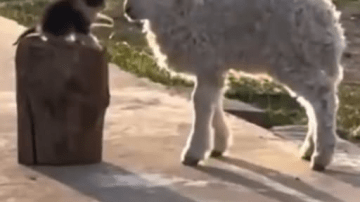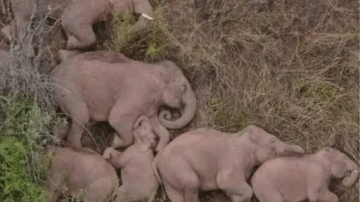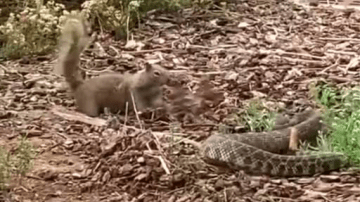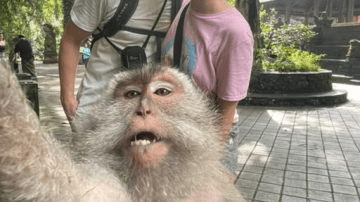The morning sun had just begun to stretch across the vast African plains, painting the tall grass in shades of gold. The air was still, the kind of stillness that feels sacred—before the wind stirs, before the day begins. A herd of elephants moved slowly through the landscape, their massive forms casting long shadows over the earth. Mothers guided their calves gently, older elephants walked side by side in silence, and deep, resonant rumbles vibrated softly beneath the surface of the world.

Then, suddenly, the rhythm broke.
The matriarch stopped first, sensing something. The others followed, their footsteps slowing until the entire herd stood motionless. Dust hung in the air, thick and heavy. In the center of the circle, a baby elephant lay still—her small body motionless, her breath gone.
Her mother stood over her, trembling.
The Sound of Grief in Silence
She reached out with her trunk, touching the calf’s side, nudging her gently as if trying to wake her. Once, twice, again. Each touch was slower, more desperate. When no response came, she let out a low, heart-wrenching rumble that rolled through the air like thunder.
It wasn’t a cry that asked for help. It was the sound of recognition—of loss too deep for words.
The herd gathered close. Elephants, known for their deep emotional intelligence, have been observed mourning their dead, and on that morning, it was unmistakable. They stood shoulder to shoulder around the fallen calf, forming a silent ring of protection. No one moved. No one ate. The only sound was the wind whispering through the grass.
One by one, they approached.
Each elephant extended a trunk, touching the baby’s small body, brushing away flies, tracing the outline of her head as though memorizing her one last time. It was a ritual of remembrance, a collective farewell.
A Mother’s Unbreakable Bond
Hours passed, but the mother refused to leave. She stayed beside her baby, shifting from side to side, sometimes lowering her head until it nearly touched the ground. Her trunk explored every inch—over the calf’s ears, down her back, tracing her trunk as if trying to remind herself what it felt like to be whole.
There was no rushing her grief.
The herd waited, too. They didn’t abandon her. Instead, they lingered nearby, grazing quietly, occasionally rumbling low in support. In their own way, they were giving her space to mourn.
It was one of nature’s most profound displays of empathy—a mother clinging to what was lost, and a family that understood her pain without needing to speak it.
The Language of Love Beyond Words
If you’ve ever stood near elephants, you know their presence carries weight beyond their size. They are creatures of memory, emotion, and connection. Scientists have long studied their behaviors, but what they often find defies simple explanation.
Elephants grieve. They remember. They comfort.
This mother’s vigil wasn’t instinct—it was love. A love that refused to disappear even when life did.
After several hours, the matriarch of the herd released a deep rumble—a signal that it was time to move. The others began to walk slowly toward the horizon, their massive bodies fading into the amber light of morning. But the mother stayed behind, still touching her calf’s trunk, as though holding onto one last thread between life and loss.
The Final Goodbye
Eventually, something shifted. Perhaps it was exhaustion. Perhaps it was acceptance. The mother lowered her trunk one final time, resting it gently across her baby’s face. For a long moment, she stood perfectly still.
And then, she stepped back.
She turned toward the horizon where her herd was waiting and began to walk. Slowly, deliberately, she followed them into the fading light.
The calf remained behind—still, silent, but surrounded by the imprint of love that had filled those last hours.
To witness it was to understand that grief is not only human. It’s something shared across life itself.
The Photographer’s Reflection
A wildlife photographer, watching from a respectful distance, later described the scene with tears in his eyes. “I’ve seen elephants fight lions, I’ve seen them tear down trees,” he said softly. “But that day, I saw something stronger than power. I saw love.”
His photos captured the entire sequence—the stillness of the herd, the gentle touches, the mother’s final farewell. Each image told a story too vast for language, yet somehow universal.
It wasn’t about survival. It was about devotion.
Lessons from the Savannah
What happened that morning wasn’t unique, but it was unforgettable. Elephants across Africa have been seen mourning in similar ways—returning to the bones of lost relatives, standing in silence, even carrying tusks or bones for miles.
They understand loss in a way that mirrors our own.
Their grief reminds us that love doesn’t end when life does. It lingers—in memory, in spirit, in the spaces between what was and what still is.
| Emotion | Expression in Elephants | Human Reflection |
|---|---|---|
| Grief | Staying near the fallen | Holding onto memories |
| Love | Gentle touches with the trunk | Words, hugs, presence |
| Acceptance | Following the herd | Learning to move forward |
Watching the herd move on that day, it was clear that love and loss are not opposites—they coexist. Love makes grief possible. Grief makes love eternal.
The Enduring Heart of a Mother
As the mother elephant disappeared into the shimmering distance, she left behind more than her calf. She left behind a story—a message carved into the heart of the earth itself.
That to love is to risk loss.
That to grieve is to prove that love existed.
And that even in the wild, where survival is harsh and constant, compassion still reigns.
The elephants’ slow, deliberate departure felt almost ceremonial, like a procession guided by instinct and emotion intertwined. They carried her grief with them, not as a burden, but as a reminder of who they were—a family bound not just by blood, but by loyalty, empathy, and memory.
The Meaning of Endurance
When people later saw the photographs, thousands were moved. Comments flooded social media, not with pity, but with awe. Because in those moments of silence, those powerful creatures had shown the world something humanity often forgets: love endures beyond everything.
It doesn’t fade with time. It doesn’t die with the body.
It remains—etched in memory, woven into the earth, echoing through the hearts of all who witness it.
That mother’s final gesture—the tender touch of her trunk against her baby’s—wasn’t just an act of mourning. It was an act of defiance. Against death. Against despair. Against forgetting.
It was her way of saying: You were here. You mattered. You are loved.
And then she walked away—not because the love had ended, but because it would forever live within her.
The Eternal Lesson
The savannah returned to quiet after the herd disappeared. The golden light deepened into dusk, and life continued as it always does. But something lingered in that silence—the weight of love that had filled the air hours before.
That morning was not just about loss. It was about the invisible threads that connect all living beings—the shared heartbeat of compassion that stretches beyond species, beyond words, beyond time.
Because love, in its purest form, does not fade.
It stands.
It mourns.
It endures.
And on that quiet African morning, a mother elephant reminded the world of that timeless truth: even in loss, love never truly leaves. It simply changes form—becoming memory, becoming meaning, becoming forever.





